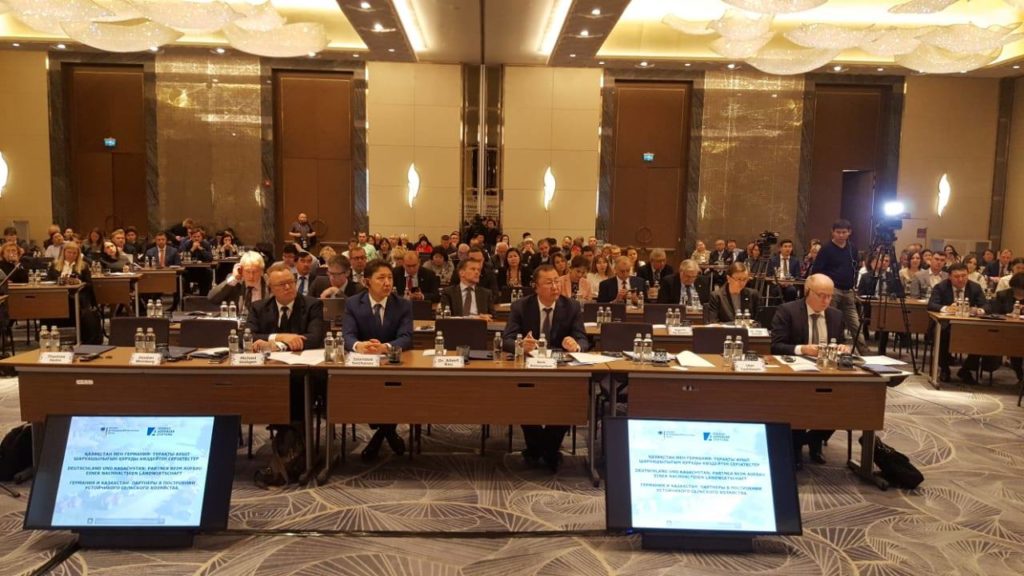ASTANA – Astana welcomed German and Kazakh businesses, representatives of governments and specialists for the conference, Kazakhstan and Germany: Partners in Building Sustainable Agriculture, Oct. 26 in Astana. They discussed increasing competitiveness in agriculture, sustainable agriculture, point farming, digitisation, logistics and research.
“The huge work is being carried out in these areas in Kazakh agriculture,” said Head of the Kazakh-German Agro-Political Dialogue Jorg Dinkelaker.
“Germany played an important role in creating value added chain in meat and dairy production. It optimised its production and made it profitable. A big role is attributed to research and science component reflected in various forms. We are ready to share our experience. Of course, we need to adapt it to local conditions and demands of the Kazakh side,” he said, emphasising an interest among Kazakh companies.
Germany has been among the biggest investors in the Kazakh economy, whose companies have invested nearly $4.2 billion since 2005.
Deputy Chair of Kazakh Invest national company Marat Birimzhan said the contribution is particularly important due to its focus on non-primary sectors of the economy, which is a current priority for Kazakhstan.
“In comparison to $20 billion that we receive each year as foreign investments, this amount of $4.2 billion is very important, because 90 percent of German investments are in priority sectors of our economy (non-extractive, export oriented industries) like manufacturing and agriculture. I would like to note that Germany is not only our reliable partner in building sustainable agriculture, but also partner in the country’s sustainable development,” said Birimzhan.
He stressed the importance of the agriculture sector that employs nearly 20 percent of the population or every fifth citizen.
The country’s agriculture sector attracted nearly $1.3 billion investments in the past five years and Birimzhan noted the figure is projected to grow with more foreign investors entering the market.
“Kazakhstan has nearly 210 million hectares of agricultural land, second in the world, and 180 million hectares are pastures that open colossal opportunities for boosting the potential and agricultural production,” he added.
“As a young country, very often we come across several stereotypes when negotiating with foreign investors. First is a small market. Yes, we are the ninth largest country the size of Western Europe, but many investors say that your market is just 18 million people, but I would like to note that thanks to our integration processes and multi-vector policy we have an access to a market of 500 million people,” he said, highlighting landlockedness and the tendency to align Kazakhstan to other countries of Central Asia among the stereotypes.
First Secretary of the German Embassy in Astana Jonathan Weinberg expressed his country’s willingness to build on the existing partnerships in developing agriculture.
“We are working based on a good trade exchange that exceeded $4 billion and we want to increase this figure. We believe Kazakh-German agriculture cooperation is a very good example,” said Weinberg.
“Why do we organise such conference? We look at agriculture as bright and very important for our cooperation. Last year, we celebrated 25 years of diplomatic relations with intensive visits, as Federal President Frank-Walter Steinmeier visited Astana and also other high-level visits. This all reflected the depth of our ties that we built in quite short period of time,” he said.
The agro-political dialogue, established with Kazakhstan since 2009 and the German agriculture centre reflect effective cooperation, said Kazakh Vice Minister of Agriculture Berik Bisengaliyev.
He spoke about Kazakhstan’s efforts to develop the sector.
“We are refining mechanisms and increasing volumes of state support. If previously, all support amounted to almost 300 billion tenge (US$818.5 million) per year, now, as instructed by the President, additional 100 billion tenge (US$272.85 million) are allotted every year and 200 billion tenge (US$545.7 million) to support affordable lending in priority sectors of the agriculture. The support was increased twofold,” he said.
State support, he noted, cannot encompass the entire sector and the ministry attracts financial institutions and second tier banks.
Investment subsidies mechanisms were also revised, he added.
“This boosted investment projects. Last year, KazAgro approved 40 investment projects worth 45 billon tenge (US$122.78 billion), while in nine months 52 projects worth 61 billion tenge (US$166.44 million) were financed,” he said.

